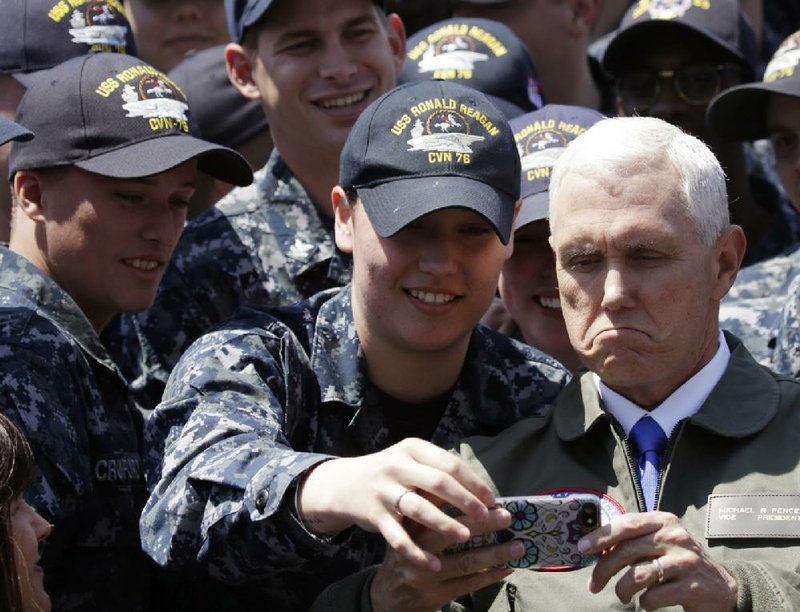YOKOSUKA, Japan -- From the wind-swept deck of an aircraft carrier, Vice President Mike Pence on Wednesday warned North Korea not to test the resolve of the U.S. military, promising it would make an "overwhelming and effective" response to any use of conventional or nuclear weapons.
Pence, dressed in a green military jacket, said aboard the USS Ronald Reagan that President Donald Trump's administration would continue to "work diligently" with allies like Japan, China and other global powers to apply economic and diplomatic pressure on Pyongyang. But he told the sailors, "as all of you know, readiness is the key."
"The United States of America will always seek peace but under President Trump, the shield stands guard and the sword stands ready," Pence told 2,500 sailors aboard the carrier at the U.S. Yokosuka naval base in Tokyo Bay.
"Those who would challenge our resolve or readiness should know, we will defeat any attack and meet any use of conventional or nuclear weapons with an overwhelming and effective American response," Pence said.
[PRESIDENT TRUMP: Timeline, appointments, executive orders + guide to actions in first 100 days]
The vice president said the U.S. would honor its alliance with Pacific Rim nations and protect freedom of navigation in the South China Sea, the sea lanes vital to global shipping where China has been staking claim to disputed territory.
In an interview on Wednesday afternoon, Pence adopted a harder line than his earlier focus on negotiations: The Trump administration, he said, demands that North Korea abandon its nuclear and ballistic missile programs without any promise of direct negotiations with the United States.
"I think the path of negotiations with North Korea has been a colossal failure now for more than 25 years," Pence said. "We believe that through discussions and negotiations among nations apart from North Korea that we may well be able to bring the kind of economic and diplomatic pressure that would result in North Korea finally abandoning its nuclear ambitions and its ballistic missile program."
He pointed to North Korea's violations of the 1994 Agreed Framework negotiated by President Bill Clinton's administration and the violations of the 2005 denuclearization agreement negotiated by the administration of George W. Bush.
"All of those negotiations and discussions failed, miserably," Pence said. "The time has come for us to take a fresh approach. And the approach President Trump has taken is not engagement with North Korea but renewed and more vigorous engagement with North Korea's principle economic partner [China]."
Pence acknowledged that if North Korea doesn't abandon its programs on its own, and the United States is unwilling to negotiate with the regime, military action against the regime may be necessary.
"When the president says all options are on the table, all options are on the table," said Pence. "We're trying to make it very clear to people in this part of the world that we are going to achieve the end of a denuclearization of the Korean Peninsula -- one way or the other."
In several interviews and speeches this week, Pence has described the Trump administration's North Korea strategy as a clean break from the Obama administration's policy of "strategic patience." In fact, there are some similarities. Like Trump, former President Barack Obama sought Chinese help to place pressure on North Korea to make concessions.
But the new strategy Pence described does break from Obama's in two key respects. First, the Trump administration is not seeking concessions as a means to return to negotiations, as Obama did.
Also, according to Pence, Trump is directly engaging the Chinese leadership on the issue.
Pence also spoke about his visit to the demilitarized zone, where he stood outside the Freedom House on the South Korean side of the border and stared into North Korea.
"I thought it was important that we went outside," he said. "I thought it was important that people on the other side of the DMZ see our resolve in my face."
He said it reminded him of when he was a 19-year-old traveler in Germany in 1978. He visited Checkpoint Charlie at the Berlin Wall and looked across to communist East Germany.
"I'd always believed I'd walked from freedom into tyranny. And I hadn't felt that way until I stood outside the Freedom House," he said. "Just looking across [into North Korea], hearing the propaganda blaring, seeing the guards in the towers, it gave me the same feeling I had in 1978."
Information for this article was contributed by Ken Thomas, Robert Burns and staff members of The Associated Press; and by Josh Rogin of The Washington Post.
A Section on 04/20/2017


